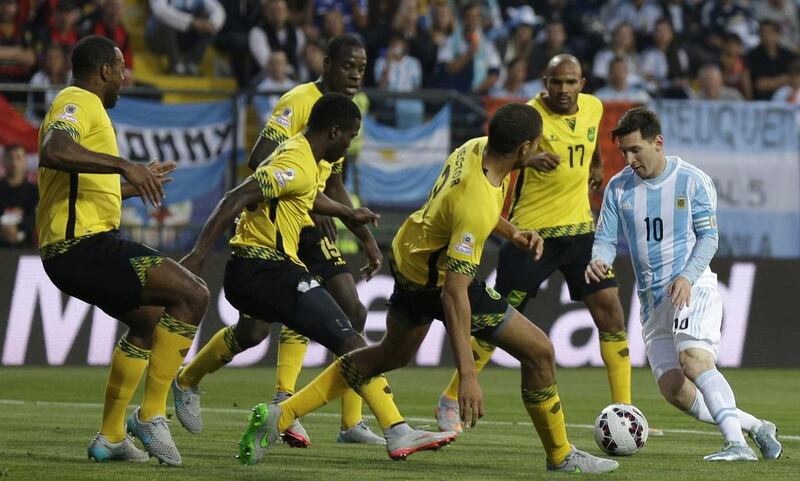Do not be surprised to see more and more shocks in international football. Small countries such as Iceland, Wales, Northern Ireland and Albania have qualified for Euro 2016 while more established nations like Netherlands and the 2004 winners, Greece, failed.
There are similar patterns in South America. Brazil and Argentina both lost their opening qualifying games for the 2018 World Cup. Argentina’s home defeat to Ecuador surprised, but I was not stunned by it. Every country is getting better and there are several reasons for this.
Football’s globalisation is helping national teams everywhere. In some ways, it should help the best teams; pitches are more consistent and uniform which should suit the best players, yet other factors are working in favour of the smaller countries.
When I started playing, you would have countries in South America where perhaps their best two players were playing in Europe. They stood out from the others who played in their domestic leagues. Now, the majority of South American internationals play abroad. Standards have risen. A Paraguayan player in Spain’s La Liga is playing at a far higher standard than his own domestic league.
Playing abroad does four things: It raises the technical level of the footballer, but also the fitness and the level of professionalism. Players see how the top teams in Europe travel, prepare, train and eat. They then return to South America and demand the same. They know that if they fail to prepare, then they should prepare to fail. They eat better, sleep better, and they play better.
They know that they are putting themselves in the shop window all the time because every game is now available on television around the world. A coach in England would not have watched an Ecuador game 15 years ago apart from in the World Cup. He can now.
Playing in Europe also gets the players used to playing against the best. You do not need to be a star, but if you play for a team like Deportivo La Coruna or Sevilla in Spain then you will be playing frequently against Cristiano Ronaldo and Lionel Messi.
You realise that while they are brilliant, they are also human, they are not unreachable or unbeatable. There is no standing in the tunnel in shock because you think that you are about to play against a ghost whom you will chase but not get near all game. The mystique around the best players has gone.
Say, for example, you play for Celta Vigo, like the Chilean players Fabian Orellana and Pablo Hernandez, why are you going to fear Neymar or Messi when your club has just beaten Barcelona 4-1?
Apart from that, Chile have some brilliant players of their own – Alexis Sanchez, Arturo Vidal, Eduardo Vargas, Gary Medel and Claudio Bravo. I watched them beat Peru away, 4-3, on Tuesday, a superb game.
You also realise that players make mistakes and that their teams are beatable, especially in one-off games. Good results breed incredible levels of unity and confidence. That is helped by the extra pressure being put on the traditionally strong teams, where expectations are still really high.
We used that to our advantage in Uruguay – the underdog who always wanted to prove people wrong. Brazil and Argentina fans expect them to win every game because of their great players and history. But maybe they do not realise just how strong their opponents have become.
The South American qualifying group has always been very tough. Now, it is even tougher. Over a 38-league season, luck tends to even out, in a qualifying group, many of the games are “six pointers”.
Ecuador used to be very good at home. Playing at altitude helped them win almost every home game and thus qualify for World Cups. Ecuador were poor away from home, though. Not now.
Twelve of their players earn their living abroad. Many play in the strong, Mexican league, while Antonio Valencia and Jefferson Montero ply their trade at Manchester United and Swansea City, respectively, in England.
Central American countries are also better, as we found out playing for Uruguay against Costa Rica in the World Cup last year.
Coaching standards have improved too. There is better scouting, professional coaching and more sharing of information. The coaches have better tools at their disposal because of the better players.
There are other factors. Some smaller countries, such as East Timor, is giving passports to Brazilian players so they can represent them at international level, not something I necessarily agree with.
Then you have richer countries who have invested in technology and brought rich players to their domestic league and seen standards improve. Qatar, for example, are much stronger these days and are catching up with the strongest Asian teams, who themselves are far stronger than two generations ago. I realised this when playing for Uruguay against South Korea at the 2010 World Cup. They were excellent in our knockout stage game.
At least Argentina and Brazil cannot both lose their next qualifying game – they are playing each other in Buenos Aires next month. It will be a huge game.
sports@thenational.ae
Follow us on Twitter @NatSportUAE





